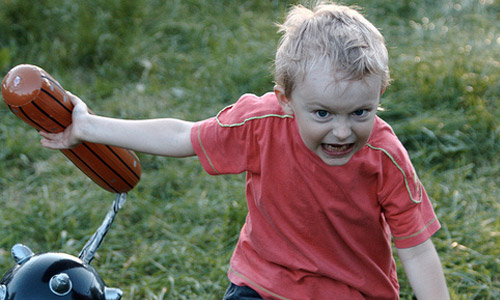How to Deal With Aggressive Children?

Is your child among those children who are loud, violent, and disobedient and throw tantrums incessantly? Do you have a hard time in teaching your child to be gentle towards everyone? Then it is time that you spend some time revising your parenting strategy and work towards reducing your child’s aggression. This is not only important for maintaining peace and harmony at home, but also to ensure that your child has proper overall development and grooming.
1. Identify the causes
The first step of course is to identify the causes of aggression. There is a chance that you and your spouse fight frequently in front of your child, making him/her feel that violent behavior is acceptable and normal. Other sources could be violent cartoons or TV shows, violent video games and other such forms of media, which if not accompanied with parental assistance, can brainwash the minds of little children. Moreover, there is also a possibility that your child’s aggressive behavior is his/her way of gaining your attention if you are too busy with your work everyday and don’t have enough time for your child. Children, most often, do not really speak up directly that they want love and attention, and turn insecure, leading to aggression, which becomes their technique of gaining attention. As a parent, you need to identify such psychological causes, and find out why your child is behaving the way he/she is. Spending sometime and talking to him/her at length will definitely give you better insight into these matters.
2. Intervene, monitor and guide
Punishment for violent or aggressive behavior is not the best solution every time. Sometimes as a parent, you need to re-invent your strategies and make sure that your child understands whatever you are trying to explain. The whole idea is to ensure that your child stops being aggressive forever, and not just once. So don’t think of harsh punishments that will have a short-term effect, and won’t help in improving the child’s behavior permanently. If your child is talking aggressively about someone, intervene and ask the child to talk about the good points of the person instead. If you see him/her fighting with someone, get your child in a private space and explain how he/she would feel if someone else did that to him/her. Make your child understand the policy of putting yourself in other people’s shoes, and think twice before doing something. The only way you can reduce aggression in your child is by building feelings of sympathy, harmony and compassion in him/her. Monitor TV time as well, and ensure that your child is not picking up any wrong habits from there and teach them the difference between real and virtual.
3. Set examples
At home, ensure that you and your spouse do not get into any sort of fights in front of your children. Even if you do get into an argument, make sure that one of you compromises and ends it as soon as possible, so that your child picks up the same habits and learns the art of compromising. Never get too loud and violent in your arguments and maintain cordial relations with all family members, maids, other helpers of the house etc., so that your child understands the importance of doing things calmly and peacefully, without considering fighting and arguing as the best way out.





